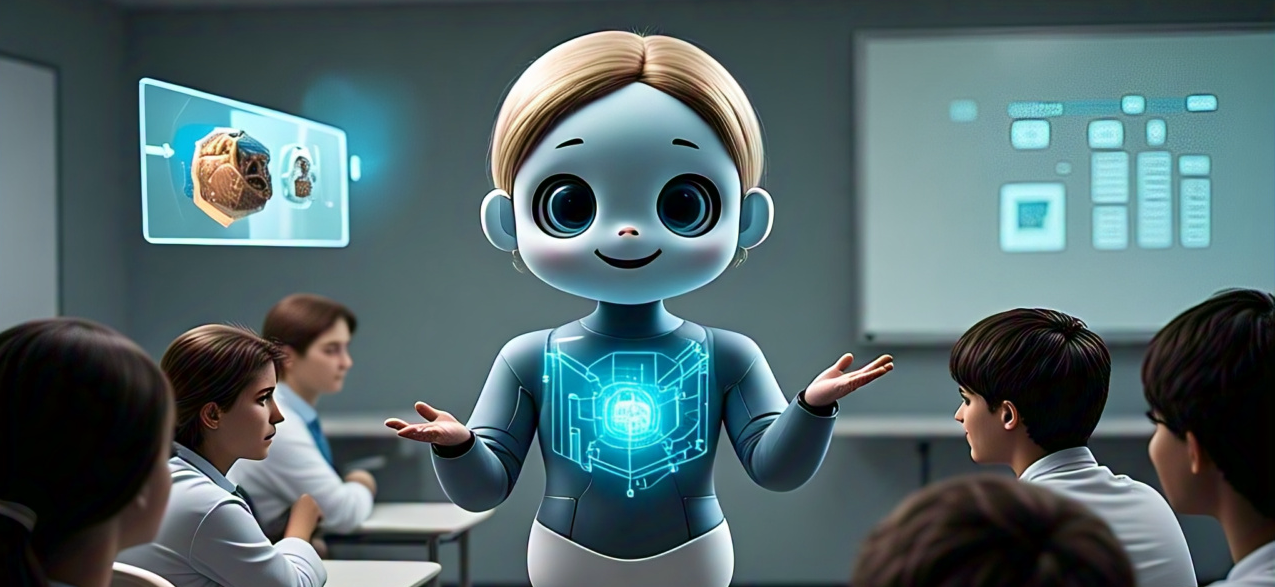Unlocking the Future: How GenAI is Set to Revolutionize Healthcare and Education

Healthcare is currently lagging behind in fully leveraging existing technology. We have technology that can predict what products you might want to buy before you even realize it (like targeted ads), but we aren’t yet applying similar advancements in healthcare to predict potential diseases.
In education, the days of needing to physically go to a building to hear from someone with specialized knowledge are long gone. The traditional “one-size-fits-all” approach, where everyone is taught the same material at the same pace, can be greatly enhanced with personalized curriculums. These tailored programs can focus on students’ strengths while addressing their learning gaps, creating a more effective and individualized educational experience.
Generative AI (GenAI) is rapidly transforming various industries, but its potential to revolutionize healthcare and education stands out. The combination of advanced data processing, machine learning, and natural language understanding has given GenAI the ability to reshape how we approach learning and patient care.
GenAI in Healthcare: A New Era of Personalized Medicine
In healthcare, the adoption of artificial intelligence has already made significant strides, but GenAI offers new possibilities for innovation. Here are key areas where it can make a substantial difference:
1. Medical Diagnosis and Decision Support
GenAI models, trained on massive datasets, can analyze patient records, medical images, and lab results to help clinicians make more accurate diagnoses. These models can provide suggestions for treatment options based on the latest medical research, patient history, and even subtle patterns that may be overlooked by human professionals. This can drastically reduce diagnostic errors and support decision-making in complex cases.
For example, a GenAI system could scan thousands of radiology images in seconds, identifying early signs of cancer or other conditions with remarkable precision. As the system learns from new cases, it becomes even more adept at identifying anomalies that may escape the human eye, speeding up diagnosis and improving outcomes.
2. Personalized Treatment Plans
Traditional healthcare often follows a “one-size-fits-all” approach, but GenAI opens the door to personalized medicine. By analyzing a patient’s genetic makeup, lifestyle factors, and medical history, GenAI can suggest highly tailored treatment plans. This can lead to more effective therapies and fewer adverse reactions, improving patient outcomes and satisfaction.
Imagine an AI-driven platform that can create a personalized healthcare plan that adjusts as new information becomes available, like changes in a patient’s condition or the discovery of new research. This real-time adaptability can help physicians stay on top of their patients’ evolving needs.
3. Virtual Health Assistants
Another exciting development is the rise of virtual health assistants powered by GenAI. These digital tools can interact with patients to answer health-related questions, provide medication reminders, or even monitor chronic conditions.
By offering continuous, 24/7 assistance, these tools can alleviate pressure on healthcare professionals, ensuring that patients receive timely advice and support without overwhelming the healthcare system.
Every person should have their own Health wallet with their medical history that can access disease prediction and health recommendation models.
GenAI in Education: Transforming Learning Experiences
While healthcare is one of the most obvious beneficiaries, education is another field where GenAI is poised to make a massive impact. Here’s how it can change the landscape:
1. Personalized Learning Pathways
In education, students often struggle with standardized curricula that may not align with their learning styles or pace. GenAI can help create personalized learning experiences that adapt to the needs of individual students. By analyzing performance data, learning preferences, and areas of difficulty, GenAI-driven platforms can offer customized exercises, recommend resources, and provide real-time feedback to enhance learning outcomes.
For instance, students who are struggling in math could receive tailored problem sets that gradually build their skills, while those excelling might be offered more challenging material to push their abilities further. This adaptive approach allows students to learn at their own pace and receive the targeted support they need to thrive.
2. AI-Powered Tutors and Assistance
AI-driven tutoring systems can offer one-on-one support to students, helping explain difficult concepts or answering questions in real time. These systems can be accessible around the clock, providing students with a resource when teachers or human tutors may not be available.
These virtual tutors don’t just help with academic content—they can also monitor emotional states and adjust their responses based on the student’s engagement level. By recognizing when a student is confused or frustrated, AI systems can adapt their teaching approach, ensuring that learning remains productive and stress-free.
3. Enhancing Educational Content Creation
One of the most promising uses of GenAI in education is its ability to create high-quality educational content quickly. Teachers can use AI to generate lesson plans, quizzes, and learning materials that are tailored to specific student needs or curriculum standards. In addition, GenAI can help generate multimedia content, including interactive simulations, videos, and digital textbooks, making education more engaging and accessible.
By offloading the more time-consuming aspects of content creation to AI, teachers can focus on delivering more personalized, hands-on instruction, ultimately improving the classroom experience.
Call to Action
Are you passionate about transforming healthcare and education through Generative AI? If you’re interested in exploring the incredible potential of AI-driven innovation in these fields, let’s connect! Whether you’re a healthcare professional, educator, or simply an enthusiast ready to make an impact, I’d love to hear from you.
Reach out to me if you’re ready to be part of this exciting journey and collaborate on shaping the future of personalized medicine and adaptive learning.
Contact me today—together, we can drive revolutionary change!